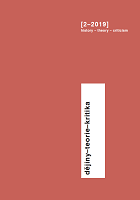Obecné, světové, globální dějiny?
General, Global, or World History?
Author(s): Miroslav HrochSubject(s): Cultural history, History of ideas, Local History / Microhistory, Political history, Social history
Published by: Univerzita Karlova v Praze - Fakulta humanitních studií
Keywords: General History; Global History; Theory of History;
Summary/Abstract: In connection with Horský’s contribution, Hroch investigates changes in Czech historiography’s relation to the concept of general history since the 1960s, while highlighting the complicated relation between Czech national history and non-national or extranational history. The author presents six ways in which the genre of extranational history could be defined and stresses their demands, contributions, and possible weaknesses. He speaks of syntheses, monographic analyses, histories of international relations, historical treatment of the so-called ‘relational’ subjects linked to national cultural, political, or economic histories, source-based studies which investigate partial subjects from the history of ‘non-national’ countries and regions based on new courses, as well as analyses and explanations of processes of social, economic, or cultural changes which took place in several countries, either synchronically or asynchronically. It is the last-named genre which Hroch believes to best correspond to the term ‘general history’ as Jan Horský understands it. He himself, however, prefers the term transnational or comparative history, history of transfer, or l’histoire croisée, and is critical of the term ‘global history’. He emphasises the different nature of processes and changes which are investigated, and different forms of methodological questions raised by historians of general history. According to Hroch, work in general history is better suited to macroanalysis (although he does not reject microanalysis), its results rest to a large extent on knowledge gained not from source materials, and its investigations either do or should apply indirect methods. This kind of investigation heavily relies on results described in secondary literature and its quality depends on the quality of these materials. It searches for and combines relations, connections, and does not see the finding of hitherto unknown facts as its primary task. It is not limited by assumption of uniqueness of historical phenomena. It prefers analysis to narration.
Journal: Dějiny - Teorie - Kritika
- Issue Year: 2019
- Issue No: 02
- Page Range: 270-274
- Page Count: 5
- Language: Czech

